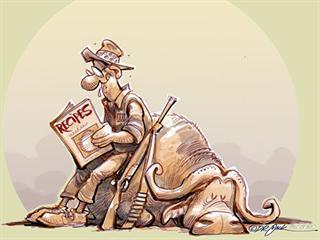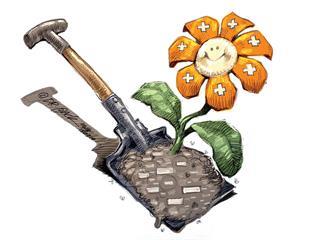
The emerging market in raw and processed game meat is important for game farmers, professional hunters, private processors, retailers and entrepeneurs. Until recently, game farmers had limited options as far as game meat was concerned. If not utilised by farm staff, it was often left out in the veld to be eaten by scavengers. This scenario changed when a growing number of people, conscious of the benefits of veld-raised game, began to demand organic protein.
Initially, hunted game and trophy carcasses were sold to processors at R5/kg. An incentive to pay more for a ‘cleaner’ carcass increased this figure to R18/kg. The market was stimulated by professional hunters and outfits that saw the potential extra income they could earn from game meat. As farmers switched to game in marginal areas, game populations grew. This resulted in the current figure of 20 million game animals in South Africa (16 million on privately owned land and four million on state-owned land) that increased the availability of game meat on the local market.
A healthy alternative
Game meat is low in fat, can lower cholesterol levels, contains more protein and minerals than beef, and is free of growth hormones and antibiotics. The health-conscious housewife now has the opportunity to prepare delicious, healthy meat dishes for her family. Because of its low fat content, game meat has been promoted in many magazines and publications for people who want or need to lose weight. Health diets include game meat for its leanness and its muscle- enhancing ability.
Local advantages
The South African consumer pays up to R33/ kg for processed game and up to R72/ kg for popular cuts. In comparison, EU game meat consumers pay up to R600/ kg for unprocessed game meat imported from South Africa. The Europeans have already discovered the benefits of eating game meat and are more than willing to pay a premium for it.
This export market was monitored with growing concern by the departments of health and veterinary public health. The Meat Safety Act 40 of 2000 prohibits the selling of meat that has not been inspected, approved and slaughtered in an approved facility. By implication, game meat available on the local market (both raw and processed) that has not been inspected, approved and slaughtered in a registered abattoir is illegal. Customers who buy game meat from a conventional retail store would be well advised to check the labels for traceability.
It is crucial for the financial development of game farms that game meat production is prioritised. This will help to ensure food security in South Africa and reduce the quantity of meat and meat products that need to be imported. Wildlife Ranching South Africa (WRSA), as the official mouthpiece of game farmers in South Africa, has taken proactive steps in this regard. The organisation acts with the support of more than 10 000 registered game farms in South Africa.
Escalating beef and poultry prices have had the effect of bringing more entrepeneurs to this market. Unfortunately, profit can sometimes take precedence over meat hygiene and quality, and for this reason controls must be in place. At the same time, WRSA has seen more and more wildlife ranchers tapping into the international meat industry. South Africa exports approximately seven million kilograms of game meat a year, mainly to Europe. Springbok makes up the bulk of this, but species such as kudu, blesbok and impala are also exported. South Africa was ranked 20th globally as a game meat exporter, producing less than countries such as Argentina, Germany and Zimbabwe.
Game scheme helps smaller farmers
WRSA has initiated a game meat scheme after negotiating with government to guide the provision of safe game meat on the local market for the next five years. Act 40 of 2000 makes provision for such schemes to be approved and promulgated by the minister of agriculture, forestry and fisheries. The game meat scheme was developed to help the smaller game farmer who produces for the local market. It provides an alternative to strict and costly regulations on game meat under the Meat Safety Act.
According to the scheme, the farm owner or his representative will be able to conduct limited harvesting at slaughter facilities on his farm while these facilities are being upgraded (if necessary) to standards set out in the scheme. The scheme will ensure the establishment of a sound infrastructure for the production of game meat. This will include hygienic practices and training of slaughter staff on basic meat hygiene, as well as the presence of a game meat examiner to conduct meat inspection on harvested carcasses. After the five-year period, the scheme will be re-evaluated and possibly extended indefinitely.
On a practical level, the various sections of the scheme will guide ante-mortem inspections, killing, slaughter procedures, cold chain maintenance, abattoir facilities and transport. The scheme will not regulate meat for own consumption, unless it is to be utilised commercially in raw or processed form.
Gaining access to markets
Game meat from scheme-registered farms will have legal and commercial status at formal food premises such as butcheries, big and small retailers and meat processors. The greatest plus of this scheme is the fact that it places the financial benefits of game meat back into the hands of the game farmer. It will enable the farmer to supply safe meat from his farm directly to the market, thus avoiding the costly middleman.
The scheme will also address the literacy of farm workers and present more career opportunities for them. Farm workers will be able to plot a career path from an illiterate level to a qualification, all of which will have tax benefits for the farmer.
The registration of the facility on the farm, and the rancher or his representative as game meat examiner, will ensure that safety and quality are not compromised.
Act soon to be promulgated
After more than five years of negotiations (from 2004 to 2010), the game meat scheme was finally published for public comment in September last year. The promulgation date in the Government Gazette is expected to be January 2014. Application forms for registration will be available from the WRSA office immediately thereafter. This much-needed control mechanism should be utilised by all game farmers to assist in building this new industry that will ensure sustainable meat production and ultimately help to provide healthy food for the nation.
For more information on the Game Meat Scheme, phone the WRSA on 012 335 6994 or Dr Maretha van der Merwe on 082 498 0685.
The views expressed in our weekly opinion piece do not necessarily reflect those of Farmer’s Weekly.













